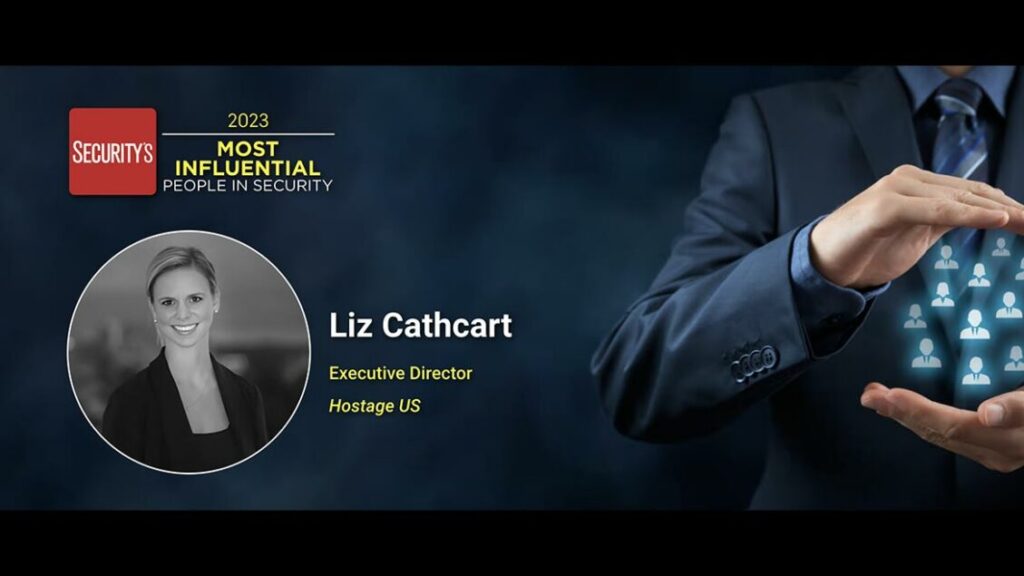
A community-based security approach
Liz Cathcart’s security career began far before she entered the field herself.
“Both of my grandparents were in the CIA and posted in Iran,” Cathcart says. “When I was in school studying, I was really interested in international affairs and relations. One of the topics that I found myself learning more about and gravitating toward was the Iranian hostage seizure.” The combination of her family history and college interest led various career paths. What eventually blended Cathcart’s interests was a new organization, Hostage US.
Cathcart joined Hostage US in 2016 prior to its official launch, working alongside the founding executive director to build the organization. Hostage US is a nonprofit focused on providing support to U.S. citizens wrongfully detained or taken hostage internationally.
“When an employee of an organization is taken hostage, ensuring family support and making sure that they are involved in the organization’s response to a kidnapping is incredibly important. There’s this nexus of the human side and operational side of security. Hostage US tries to work with organizations to make sure collaboration nicely and seamlessly for families so that they’re well-supported by their organization,” Cathcart says.
Cathcart became the Executive Director of Hostage US in 2020. Her role involves overseeing the growth of programs that support Americans who were taken hostage or wrongfully detained abroad.
“We also help organizations to reintegrate their employees back into the workforce once they’re back home. Our work focuses around ensuring global organizations have the capacity within their own teams to support families throughout cases and make sure that their employees are well-supported when they return home,” Cathcart says.
Some of the ways Cathcart’s team works with organizations is by reaching out to organizations with employees in risky areas. They work to encourage safe travel best practices along with open communication between employers and their families. Additionally, Cathcart works to assess various political shifts that may raise or reduce an employee’s risk.
“What that looks like for us is being proactive and connecting with security departments who operate in particularly dangerous or emerging dangerous areas. We keep a close eye on trends of hostage-taking and wrongful detention cases, so that we’re able to make fairly astute guesses about what the trends of increased wrongful detention might look like in the years to come,” Cathcart says.
“
While family support might seem like it falls to the HR side, it’s actually integral to a security response of a hostage situation.”
— Liz Cathcart
“I think one of the interesting and eye-opening trends that we’ve seen is that wrongful detention cases and incidents of governments detaining Americans is increasing,” Cathcart says, “and for an employer, that is an incredibly difficult challenge to manage. It can span for years, and it’s not within the skillset of any particular organization to be able to respond to those types of wrongful detentions.”
Cathcart witnessed an interesting shift in travel and wrongful detention trends. As countries began to recognize the success in using wrongful detentions as leverage against the U.S. government, detentions began to increase. This stopped suddenly in 2020, as COVID-19 meant people weren’t traveling at the same rate they used to. However, as borders opened and travel increased, so did the rate of wrongful detentions.
The family aspect of security
Cathcart emphasizes the importance of family liaison and support in the security industry.
“While it might seem like it falls to the HR side, it’s actually integral to a security response of a hostage situation. The family is an essential part in any decisions that are made during our hostage or wrongful detention response plan,” Cathcart says. “When families are brought into the discussions with security, the response is made a lot easier because you have a good relationship with the family members who will then be making — or at least involved in — a lot of these decisions.”
As Executive Director, Cathcart also navigates public-sector partnerships and public attention. The nature of hostage situations can bring large amounts of media attention. This can be either a help or a hindrance in the reunification process, making it complicated for security leaders to navigate.
“We want to make sure that the organization understands all aspects of what media means to these types of crisis,” Cathcart says.
In addition to media, Cathcart and her team must look into what resources are available. This can range from insurance coverage to navigating means for financial support for the involved families.
“We talk a lot about auditing the resources available within the security department to support families. Oftentimes that means looking inwards, within your own security department and thinking, ‘What do we have in place that we can use to support families who are going through this, and where are the gaps that we need to fill to make sure that if we’re faced with this, we have the right support system in place?’”
Cathcart says she’s most proud when she sees “an organization that is particularly good and focused on the support of their employees, and they meet their duty of care in this context. I feel really proud that we’re able to influence the development in that relationship in some way.”



